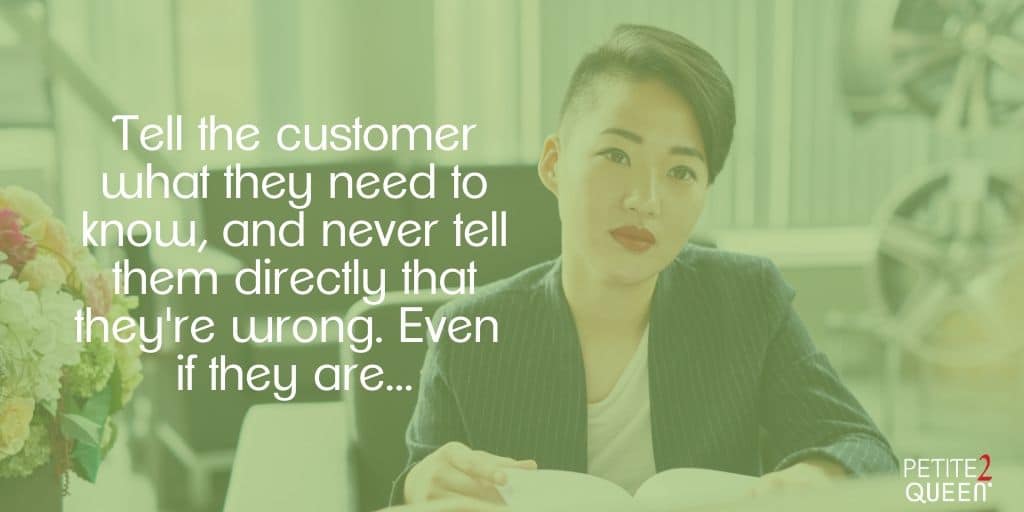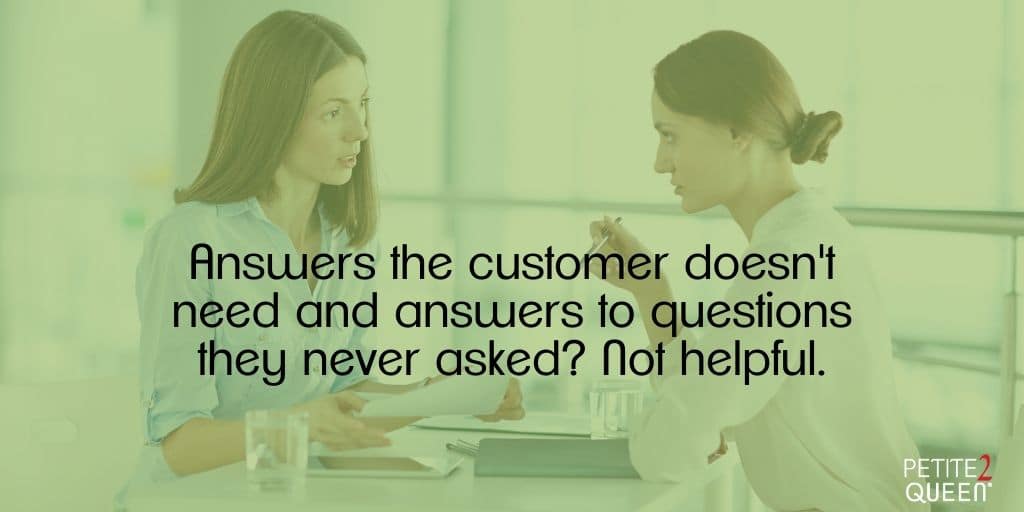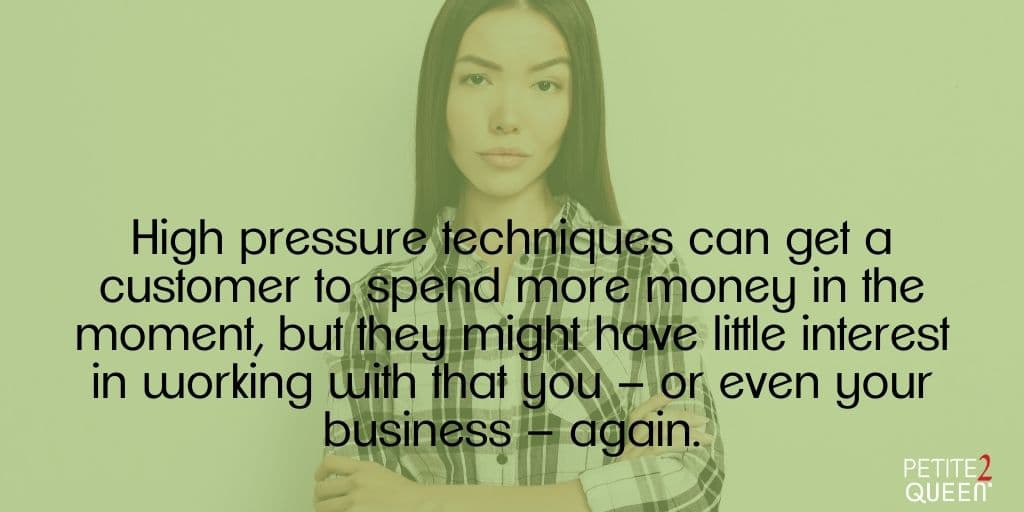You can’t have sales without customers.
That statement may seem obvious to the point of simplicity, but it highlights an often-forgotten part of the business world: You can’t sell anything if no one wants to buy. What do customers want? How can your interactions with these important people make you into the best salesperson you can be?
While every customer presents a different challenge, there are a few specific behaviors that make or break just about every sales interaction.
The Customer is Always Right…
This is the first rule of customer service for a reason. Of course, the customer is not always right in reality – we wouldn’t need sales representatives if customers knew everything – but you still have to start in this position.
For me, any sales interaction is sweeter when the representative validates my perspective. Tell me what I need to know, never tell me directly that I’m wrong. Even if I am…
Take Salesperson A and Salesperson B below. Which of them will make the sale?
A: “No, we don’t sell landlines, because landline phones are dinosaurs. You’re insane if that’s what you want, especially when we have the best cell phone ever!”
B: “Yes, I totally see your point that landline phones are the superior technology, but let me tell you about how our cell phone reproduces the best part of the landline experience!”
Obviously, B has the edge. After all, can you imagine a quicker way to shut down a sale than that single word, “no”?

Answer Questions… the Customer’s Questions, That Is
Seen from my point of view as the customer, sales is a question-and-answer game. Why do I need to make the purchase? How will this help me? Should I know more before I proceed? A sales representative who won’t or can’t answer those questions is of little help to me.
Not only do some salespeople fail to answer, but others deflect my questions into new and unwanted avenues. Answers I don’t need and answers to questions I never asked? Not helpful.
This happened the last time I tried to buy a car. Because I like research, I had a pretty good idea of what I wanted when I walked in the dealership door. Didn’t do me much good though: Every question I asked about my desired model was met with “But let me tell you about this new car that will make all your dreams come true!”
This is never a good idea. When a customer knows what she wants, you give it to her as best you can. Only after that are other pitches OK. You may be dying to tell me about your newest, coolest product, but that’s of little help when my needs are directed elsewhere.
Turn Off the Pressure
From the sales side, high pressure may seem valid. You need to get your numbers, right? Unfortunately, the customer has a very different perspective. I have had too many sales representatives try to pressure me into bigger or additional purchases over the years. Quite frankly, I hate it.
What happens when a customer like me needs to buy a computer? I do some research and then head over to my local fruit-named, glassed-in cube of a store to make my purchase. But that’s when things can get tricky. I may want to buy the basic model that will fulfill all my actual needs, but what about… The pressure is on. Will the salesperson bully me into hundreds, maybe thousands, of dollars in my purchase?
She might. And that’s the problem.
Yes, high pressure techniques can get a customer to spend more money in the moment. But I have little interest in working with that sales representative – or sometimes even that business – again when I know the pressure that awaits my next interaction. No one likes to be bullied!

Know Your Stuff
Like most customers, I expect my salesperson to provide the information necessary to make informed decisions. What are you selling? How will it benefit me? And what about any product quirks that only an expert can see coming?
Remember that car purchase from before? I am, quite frankly, not an automotive expert (at best, I know where the oil goes, kind of). When I eventually did buy my car, it only happened after I got lots of information. Mileage, great features, not-so-great features, warrantees, maintenance plans… I needed to know all of this, and my salesperson could have given me a college-level course in the car.
Good sales representatives can answer my questions. The best sales representatives make me feel like an expert too.
Stay Interested
Here’s the thing: If you’re not interested in selling me something, I’m not interested in buying it. There are way too many places to spend my money to waste it on a product that bores its own representative.
Take clothes shopping. I personally hate it when necessity sends me to a department store for a new pair of pants or a bra. That, however, is just an opportunity for the right salesperson to get me excited – too bad so many of them miss it! So many times, I have asked about jeans, only to get a vague wave in the direction of the appropriate clothes. Or a dismissive “I don’t think we carry that size” when I asked about a bra.
It’s disheartening. It’s insulting to both customer and product. And it’s the fastest way to get me to walk out.
I don’t expect your product to be your life, but it should matter to you. The salesperson who knows her stuff and wants to talk about it? She is the one who gets me excited to spend my money!

The Salesperson is Always Right Too
Confidence is key in sales, and the customer knows this. The good salesperson knows her product, knows her customer, and knows when the sale is ready to happen. When I see confidence, I want to make purchases.
Yes, the customer needs to be right. But you, as the sales representative, need to be right too. With so much of this advice, confidence in yourself is the key. Keep that in mind, and sales will follow.
Petite2Queen provides virtual mentoring to young women in life, at work, and in sales. Follow us for more practical advice you can put to use to improve your life and career.
Laurel Brown is a writer and social-media expert. Ridiculously over-educated, she has an undergraduate degree in astrophysics from Colgate University and graduate degrees in Middle Eastern studies from Columbia University. When not playing professor or interviewing Hollywood celebrities for online publications, Laurel’s career included a stint in marketing at a Fortune 500 company. She is now pursuing a law degree in an attempt to become a true Renaissance woman.

